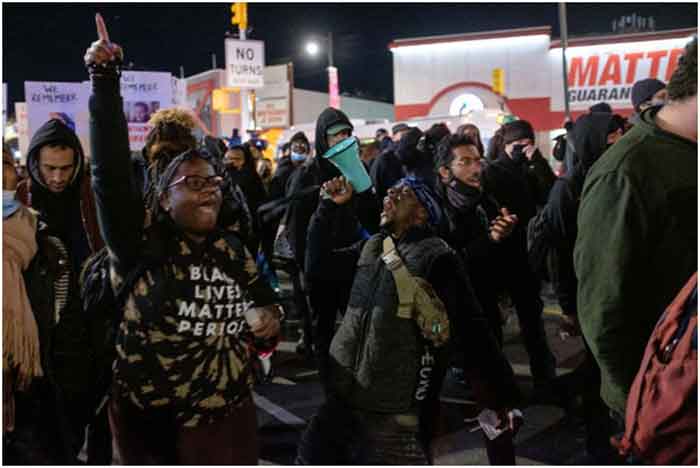Without radical action, there is no “reforming” ingrained issues of supremacy and racism in the US

Image: Several hundred people march on Flatbush Ave. in Brooklyn on Friday to protest the acquittal of Kyle Rittenhouse by a Wisconsin jury. (Gardiner Anderson/for New York Daily News)
Upon watching the news of the Kyle Rittenhouse verdict on CNN with my family in Amman, Jordan, where I am visiting, I cringed and felt a sense of shame, as the American among them, helpless to frame it for them in a way that would redeem (for both of us) the illusory promise of change in a deeply-flawed US system.
Just back from Madrid, Spain, where I participated in Masar Badil, the Alternative Palestinian Revolutionary Path conference, I could only think of an article written by Adam Littlestone-Luria a few days ago (Nov 15) in NewYorkUniversityLawReview titled The Illusion of Permanence: Post-Trump America, Rome, and the Challenges of Restoration, in which he says:
Well-functioning political systems depend not simply on a sense of legitimacy, rightness, or fairness, but also on a widespread illusion of permanence. People comply with the basic structure of institutions and norms in large part because they think that the system is not going anywhere. They translate dissatisfaction into reform, rather than revolution, because their imagination is restricted by the sense that the basic structure will inevitably endure. Long-lasting republics — from the U.S. to Ancient Rome — have relied on this constrained imagination. Rome’s example shows that, when the illusion of permanence breaks, democracy may be in danger.
It is clear to me that it takes radical action and ideology from either the left or the right to sway a “democratic” system one way or another. Just as there is no “reforming” Israel’s colonial existence as a Jewish state in Palestine without radical action, there is no reforming ingrained issues of supremacy and racism in the US without radical action.

Image: Rittenhouse Acquittal: Hundreds March Through Brooklyn, Block Traffic On Brooklyn Bridge To Protest Verdict (Capture from CBS video clip)
Same goes for France, as the other piece of news that has people buzzing in Amman shows. It has to do with the permanence of France’s colonial arrogance, its reckoning with its colonial past. Even though Macron has “gone further than any of his predecessors in recognizing the scale of abuses by France in the North African country … [and] acknowledged that France had instigated a system that facilitated torture during the 1954–1962 Algerian war, which ended 132 years of French rule,” France is a country where the colonization of Algeria continues to be viewed as benign and the French electorate by and large is still opposed to the idea of repentance.
And that is why, as Al-Jazeera reported in October: “Macron hosted summit as part of efforts to reshape France’s ties with ex-colonies, but analysts believe French president’s focus is on symbolic [rather] than structural moves.“
By declaring in the 2017 French presidential elections that the colonization of Algeria was a crime against humanity, Macron caused a “sensation.”
Likewise, when it comes to US foreign policy towards Israel, the US electoral system has severe limitations. Democrats are finding ways to pay allegiance to Israel and its lobby while trying simultaneously “to soften criticism from a party base which is becoming ever more supportive of Palestinian rights,” as Ali Abunimah blogged in April 2021 (J Street brings together progressives, Israeli war criminals).
It takes strong language and action such as that in the recent statement by The Democratic Socialists of America BDS and Palestine Solidarity Group (DSA BDS) on “progressive” Congressman Jamaal Bowman’s meeting with Naftali Bennet, ”a war criminal and former head of the Yesha Council, the political organization representing illegal Israeli settlements,” in Jerusalem, during J Street’s Propaganda Trip recently.
Congressman Bowman is a DSA member!
The statement calls on the National Political Committee (NPC) to expel Bowman if he does not immediately agree to three demands.
The DSA BDS and Palestine Solidarity Working Group (BDS WG) condemns these actions [Bowman’s visit and photo op with Naftali] in the harshest terms and, in line with local chapters across the nation, demands that the National Political Committee (NPC) hold Bowman accountable to DSA’s principles, policies, and resolutions, including on Palestine and BDS. We also specifically denounce J Street alongside all other Zionist propaganda organizations.
In keeping with the radical spirit demonstrated by the DSA above and by Masar Badil, writer and activist Khaled Barakat asks in an op-ed in Al-Akhbar titled Palestine: Big People… Diminutive Leadership (my translation):
… How then can the Palestinian people accept a diminutive leadership such as the Palestinian Authority (PA) and Mahmoud Abbas in Ramallah? The same question is also true of every people who accept their illegitimate political system. How do the great Egyptian people accept the Sisi regime? How do the Lebanese people accept the sectarian and quota system?
The above question is not directed at the people, and it reflects a great deal of cleverness and superficiality, as the Palestinian Authority is an integral part of the Zionist colonial project and a tool of liquidation and expungement. It is a question directed to the political forces that present themselves as the currents of resistance and liberation, and opposition movements that are different from the PA and its project. In the ideological programs [of these movements] they want to defeat the Zionist project and liberate Palestine from the river to the sea. Then [paradoxically], they respond to the first call — or summons — issued by the president of the corrupt Authority and run to the so-called “bilateral meetings” and the false “reconciliation rounds!”
My question to Bowman and his ilk and to the jury in the Kenosha case is the same as that posed by Khaled Barakat above: How can you?
Rima Najjar is a Palestinian whose father’s side of the family comes from the forcibly depopulated village of Lifta on the western outskirts of Jerusalem and whose mother’s side of the family is from Ijzim, south of Haifa. She is an activist, researcher and retired professor of English literature, Al-Quds University, occupied West Bank.












































